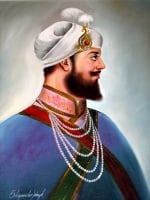Template:AOW198: Difference between revisions
Hari singh (talk | contribs) No edit summary |
Hari singh (talk | contribs) No edit summary |
||
| Line 8: | Line 8: | ||
'''[[Piri]]''': This word has also been derived from [[Persian]] word - “[[pir]]” literary meaning saint, holy man, spiritual guide, senior person, head of a religious order and stands for spiritual power or moral authority. In [[Sikhi]], the words [[miri]] and [[piri]] are frequently used together. | '''[[Piri]]''': This word has also been derived from [[Persian]] word - “[[pir]]” literary meaning saint, holy man, spiritual guide, senior person, head of a religious order and stands for spiritual power or moral authority. In [[Sikhi]], the words [[miri]] and [[piri]] are frequently used together. | ||
'''[[Miri Piri]]''': The adoption of the term “miri piri” in the Sikh tradition has been made to connote the temporal and spiritual components of life; the materialist concept of human existence and the spiritual aspect of human life. [[Guru Hargobind]] by wearing the two [[kirpan]]s of [[Miri Piri|Miri and Piri]] has endowed on the Sikhs the importance of these two important aspects of life. The term represents for the [[Sikh]]s a basic principle which has influenced their thought and has governed their social structure, political behaviour, communal organisation, leadership and politics. | '''[[Miri Piri]]''': The adoption of the term “miri piri” in the Sikh tradition has been made to connote the temporal and spiritual components of life; the materialist concept of human existence and the spiritual aspect of human life. <!---------[[Guru Hargobind]] by wearing the two [[kirpan]]s of [[Miri Piri|Miri and Piri]] has endowed on the Sikhs the importance of these two important aspects of life. The term represents for the [[Sikh]]s a basic principle which has influenced their thought and has governed their social structure, political behaviour, communal organisation, leadership and politics. | ||
[[Guru Hargobind]]] was only eleven years old at the time of the martyrdom of his father, [[Guru Arjun Dev]]. He was faced with two choices, either to let the [[Muslim]] tyrannical rulers (Mughals) and fanatical clergy to annihilate [[Sikhism]] and other non-Islamic religions of [[India]] or fight the tyranny. Guru Sahib chose the latter and showed extraordinary personal courage, valour and political acumen and manoeuvred Sikhism on its course chartered by [[Guru Nanak]] through the crucial initial stages. ------------>{{aowf|Miri Piri}} | [[Guru Hargobind]]] was only eleven years old at the time of the martyrdom of his father, [[Guru Arjun Dev]]. He was faced with two choices, either to let the [[Muslim]] tyrannical rulers (Mughals) and fanatical clergy to annihilate [[Sikhism]] and other non-Islamic religions of [[India]] or fight the tyranny. Guru Sahib chose the latter and showed extraordinary personal courage, valour and political acumen and manoeuvred Sikhism on its course chartered by [[Guru Nanak]] through the crucial initial stages. ------------>{{aowf|Miri Piri}} | ||
Revision as of 22:28, 20 July 2009

For many years now, the Sikh community worldwide have honoured the sixth Guru's vision of Miri and Piri and have celebrated this vision on 21 July every year by calling this day, Miri Piri Divas.
Miri: This word has been derived from the Persian word - “miri”, which itself comes from the Arabic “amir” which literary means commander, governor, lord, prince, etc, and signifies temporal power, "political" or "material" power.
Piri: This word has also been derived from Persian word - “pir” literary meaning saint, holy man, spiritual guide, senior person, head of a religious order and stands for spiritual power or moral authority. In Sikhi, the words miri and piri are frequently used together.
Miri Piri: The adoption of the term “miri piri” in the Sikh tradition has been made to connote the temporal and spiritual components of life; the materialist concept of human existence and the spiritual aspect of human life. .....More
